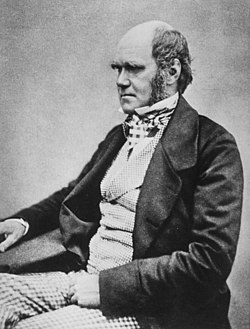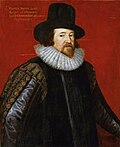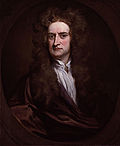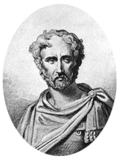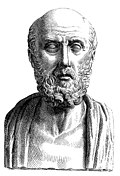Ehsan Danish
The History of Science Portal
The history of science covers the development of science from ancient times to the present. It encompasses all three major branches of science: natural, social, and formal. Protoscience, early sciences, and natural philosophies such as alchemy and astrology that existed during the Bronze Age, Iron Age, classical antiquity and the Middle Ages, declined during the early modern period after the establishment of formal disciplines of science in the Age of Enlightenment.
Science's earliest roots can be traced to Ancient Egypt and Mesopotamia around 3000 to 1200 BCE. These civilizations' contributions to mathematics, astronomy, and medicine influenced later Greek natural philosophy of classical antiquity, wherein formal attempts were made to provide explanations of events in the physical world based on natural causes. After the fall of the Western Roman Empire, knowledge of Greek conceptions of the world deteriorated in Latin-speaking Western Europe during the early centuries (400 to 1000 CE) of the Middle Ages, but continued to thrive in the Greek-speaking Byzantine Empire. Aided by translations of Greek texts, the Hellenistic worldview was preserved and absorbed into the Arabic-speaking Muslim world during the Islamic Golden Age. The recovery and assimilation of Greek works and Islamic inquiries into Western Europe from the 10th to 13th century revived the learning of natural philosophy in the West. Traditions of early science were also developed in ancient India and separately in ancient China, the Chinese model having influenced Vietnam, Korea and Japan before Western exploration. Among the Pre-Columbian peoples of Mesoamerica, the Zapotec civilization established their first known traditions of astronomy and mathematics for producing calendars, followed by other civilizations such as the Maya.
Natural philosophy was transformed during the Scientific Revolution in 16th- to 17th-century Europe, as new ideas and discoveries departed from previous Greek conceptions and traditions. The New Science that emerged was more mechanistic in its worldview, more integrated with mathematics, and more reliable and open as its knowledge was based on a newly defined scientific method. More "revolutions" in subsequent centuries soon followed. The chemical revolution of the 18th century, for instance, introduced new quantitative methods and measurements for chemistry. In the 19th century, new perspectives regarding the conservation of energy, age of Earth, and evolution came into focus. And in the 20th century, new discoveries in genetics and physics laid the foundations for new sub disciplines such as molecular biology and particle physics. Moreover, industrial and military concerns as well as the increasing complexity of new research endeavors ushered in the era of "big science," particularly after World War II. (Full article...)
Selected article -
Inherit the Wind is an American play by Jerome Lawrence and Robert Edwin Lee, which debuted in Dallas under the direction of Margo Jones in 1955. The story fictionalizes the 1925 Scopes trial as a means to discuss the then-contemporary McCarthy trials. (Full article...)
Selected image

"Fuji at Torigoe" is the eightieth woodblock print from One Hundred Views of Mt. Fuji by the Japanese ukiyo-e artist Hokusai. It depicts the observatory of the Calendar Bureau during the Edo period, with astronomers working on the roof, Mount Fuji in the background. According to Hokusai scholar Henry D. Smith II, the instrument is best seen as an indication of Hokusai's interest in Western science rather than a representation of Japanese astronomical practice.
Did you know
... that the Merton Thesis—an argument connecting Protestant pietism with the rise of experimental science—dates back to Robert K. Merton's 1938 doctoral dissertation, which launched the historical sociology of science?
...that a number of scientific disciplines, such as computer science and seismology, emerged because of military funding?
...that the principle of conservation of energy was formulated independently by at least 12 individuals between 1830 and 1850?
Selected Biography -
Charles Robert Darwin (/ˈdɑːrwɪn/ DAR-win; 12 February 1809 – 19 April 1882) was an English naturalist, geologist, and biologist, widely known for his contributions to evolutionary biology. His proposition that all species of life have descended from a common ancestor is now generally accepted and considered a fundamental scientific concept. In a joint presentation with Alfred Russel Wallace, he introduced his scientific theory that this branching pattern of evolution resulted from a process he called natural selection, in which the struggle for existence has a similar effect to the artificial selection involved in selective breeding. Darwin has been described as one of the most influential figures in human history and was honoured by burial in Westminster Abbey.
Darwin's early interest in nature led him to neglect his medical education at the University of Edinburgh; instead, he helped to investigate marine invertebrates. His studies at the University of Cambridge's Christ's College from 1828 to 1831 encouraged his passion for natural science. However, it was his five-year voyage on HMS Beagle from 1831 to 1836 that truly established Darwin as an eminent geologist. The observations and theories he developed during his voyage supported Charles Lyell's concept of gradual geological change. Publication of his journal of the voyage made Darwin famous as a popular author. (Full article...)
Selected anniversaries
- 1628 - Birth of Johann van Waveren Hudde, Dutch mathematician (d. 1704)
- 1635 - First public school in the United States, Boston Latin School, is founded in Boston, Massachusetts
- 1746 - Birth of Félix Vicq-d'Azyr, French physician and anatomist (d. 1794)
- 1792 - Birth of John Thomas Romney Robinson, Irish astronomer and physicist (d. 1882)
- 1858 - Birth of Max Planck, German physicist, Nobel Prize laureate (d. 1947)
- 1867 - William Lincoln patents the zoetrope, a machine which shows animated pictures by mounting a strip of drawings in a wheel
- 1867 - Birth of Johannes Andreas Grib Fibiger, Danish scientist, recipient of the Nobel Prize in Physiology or Medicine (d. 1928)
Related portals
Topics
General images
Subcategories
Things you can do
Help out by participating in the History of Science Wikiproject (which also coordinates the histories of medicine, technology and philosophy of science) or join the discussion.
Associated Wikimedia
The following Wikimedia Foundation sister projects provide more on this subject:
-
 Commons
Commons
Free media repository -
 Wikibooks
Wikibooks
Free textbooks and manuals -
 Wikidata
Wikidata
Free knowledge base -
 Wikinews
Wikinews
Free-content news -
 Wikiquote
Wikiquote
Collection of quotations -
 Wikisource
Wikisource
Free-content library -
 Wikiversity
Wikiversity
Free learning tools -
 Wiktionary
Wiktionary
Dictionary and thesaurus
-

-

-

-

-
Random portal

 Read
Read
 AUTHORPÆDIA is hosted by Authorpædia Foundation, Inc. a U.S. non-profit organization.
AUTHORPÆDIA is hosted by Authorpædia Foundation, Inc. a U.S. non-profit organization.
